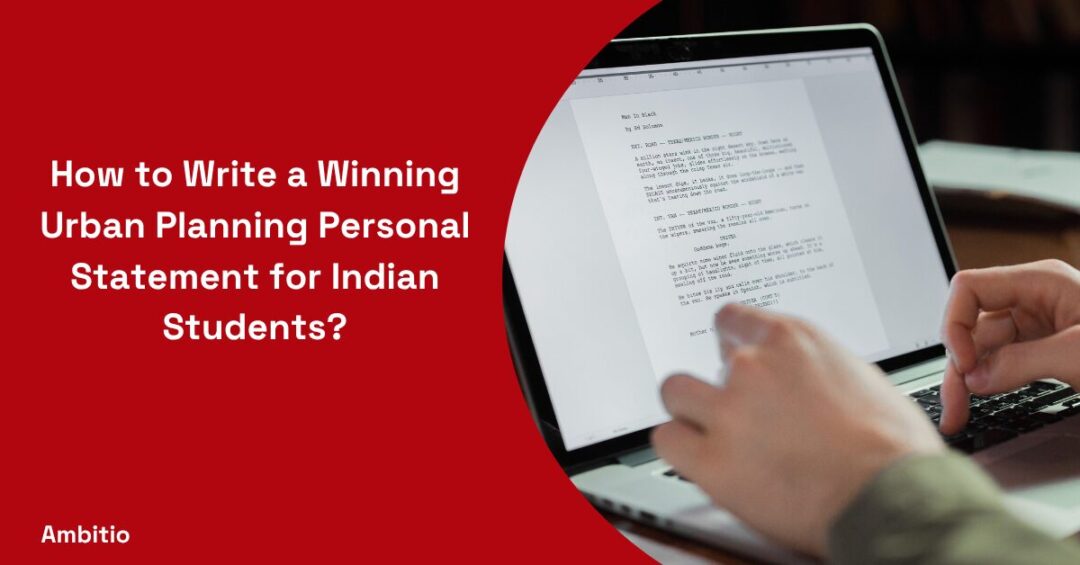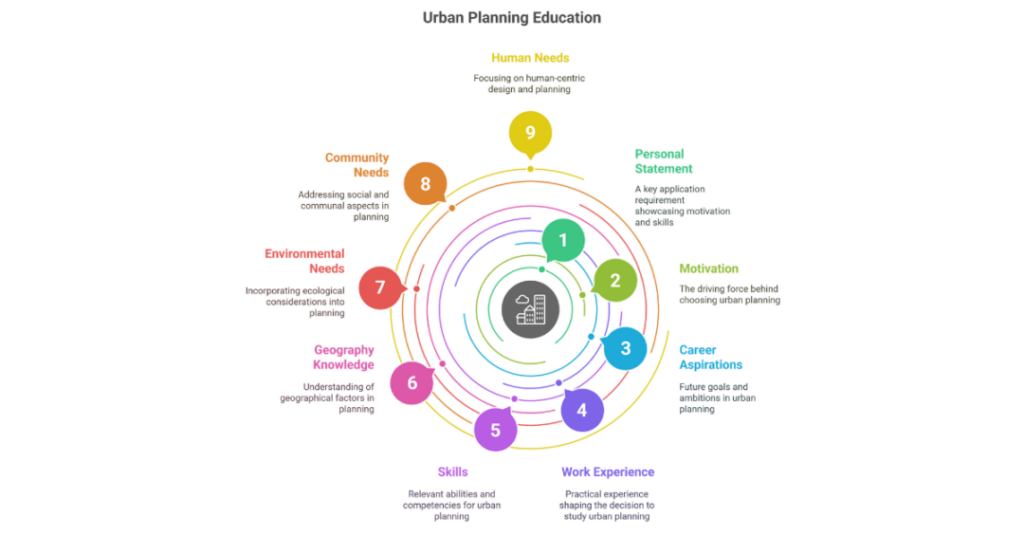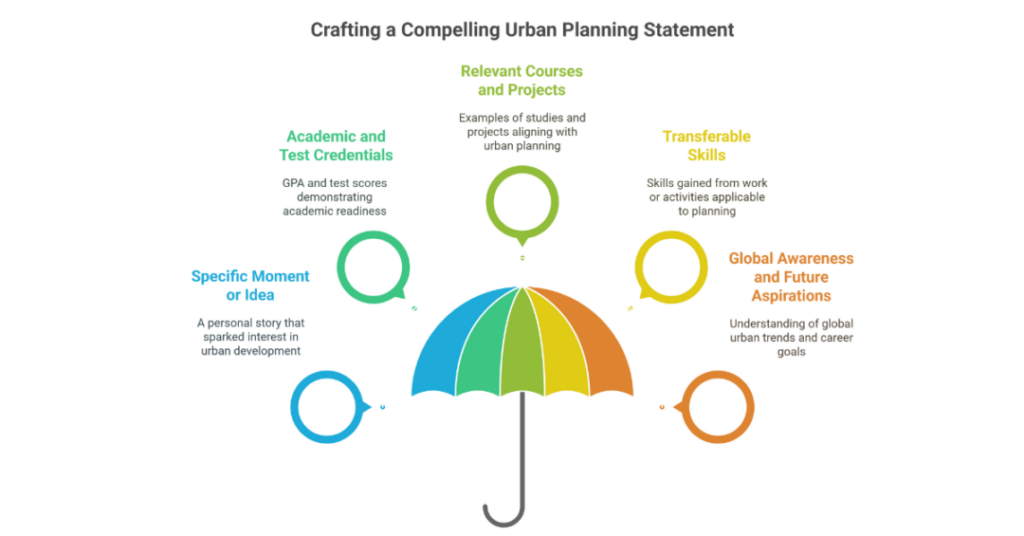4 June 2025
6 minutes read
How to Write a Winning Urban Planning Personal Statement for Indian Students?

Key Takeaways
- Urban planning personal statement must connect your skills, real experiences, and India’s urban challenges to global planning goals.
- Most Indian students lose impact by sounding generic; use specific stories, projects, and transferable skills to stand out.
- Ambitio helps transform your profile with expert guidance, turning raw ambition into a powerful, future-ready application.
Over 70% of Indian students applying abroad struggle to write a strong urban planning personal statement, not because they lack ambition, but because they don’t know how to relate their skills, academic background, and urbanization challenges in India to global planning programs.
Most end up sounding generic, with no real impact or direction. This guide helps you avoid that. Whether you’re applying to study urban planning or aiming for a career in development, this is where your real story begins.
What is Urban Planning Personal Statement, and Why Urban Planning is a Growing Choice for Indian Students?
An urban planning personal statement for university applications is a key requirement when Indian students apply for an urban planning degree, helping admissions tutors understand their motivation, career aspirations, and work experience. It must show relevant skills, geography knowledge, and how past design, field, or office work shaped their decision.

As cities expand, Indian students increasingly choose this subject to incorporate environmental, community, and human needs into impactful planning, making it a perfect fit for a future career in a changing world.
What to Include in Your Urban Planning Personal Statement?
When writing your urban planning personal statement, especially as Indian students, you need to go beyond basic qualifications. The goal is to show admissions tutors why you’re a strong candidate with a clear idea of what the course demands and what you bring to it.

Here’s what to include to make it stand out:
1. Start With a Specific Moment or Idea
Begin your urban planning personal statement with a clear idea or personal activity that sparked your interest in urban development. Avoid vague passion claims, give a story from your life or school experience that created your direction toward this course.
2. Showcase Academic and Test Credentials
Mention your GPA, and any test scores like IELTS, TOEFL, GRE, or GMAT if required. Top schools like the University of Pennsylvania or University College London expect a solid academic foundation and strong reading and reasoning skills to handle the program rigor.
3. Highlight Relevant Courses and Projects
If you studied subjects like architecture, geography, or environmental studies, explain how they connect to the planning field. Use specific examples, maybe a sustainable city design project or a research paper, that demonstrate alignment with the course.
4. Demonstrate Transferable Skills Through Work or Activities
Admissions teams look for real-world applications. Whether it’s an internship at an urban policy office or volunteering in a slum redevelopment activity, link your professional or personal experience to transferable skills like planning, problem-solving, or community analysis.
5. Mention Global Awareness and Future Aspirations
Urban planning isn’t local, it’s global. Show your awareness of how cities evolve worldwide and why studying at places like the Massachusetts Institute of Technology, Harvard, or UC Berkeley will prepare you. Tie this into your long-term goals and scholarships for international students that help make it happen.
Urban Planning Personal Statement Examples for Indian Students
Urban Planning Personal Statement Examples for Indian Students
For Indian students applying abroad, a strong urban planning personal statement isn’t just about passion, it’s about clarity, structure, and relevance.
Here’s a well-crafted personal statement example that shows how to combine personal motivation, academic background, work experience, and career goals into a compelling application.
Sample Urban Planning Personal Statement
Growing up in Mumbai, a city of vibrant chaos and rapid change, I became acutely aware of how the built environment shapes human experience. As a child, I was both fascinated and frustrated by the city’s contradictions—gleaming flyovers beside informal settlements, green pockets shadowed by concrete towers. These early observations ignited my curiosity about how cities function, and more importantly, how they can be improved. My goal to pursue an urban planning degree stems from a desire to use this knowledge to create inclusive, sustainable, and humane urban spaces.
My academic foundation in geography and architecture-related electives during my high school and undergraduate studies helped me understand the human-environment interaction from both spatial and structural perspectives. A project in my second year on “Transit-Oriented Development in Indian Metro Cities” introduced me to the planning frameworks used globally and made me realize how policies and people must align for cities to truly work. That project also marked my start in serious reading about urban design, especially texts like Jane Jacobs’ The Death and Life of Great American Cities, which helped me think beyond blueprints to communities and culture.
Beyond academics, my internship at the Pune Municipal Corporation’s Town Planning Department gave me invaluable professional exposure. There, I assisted with data collection and helped use GIS tools for mapping informal housing clusters. The experience was more than technical—it was human. I spoke to residents facing displacement and learned the importance of community participation in planning decisions. This work experience made me appreciate the role of planners not just as designers, but as facilitators of dialogue between citizens and governments.
I have also engaged in community activities such as conducting heritage walks in my neighborhood and volunteering for a lake rejuvenation project. These activities helped me understand how local identity and environmental sustainability must be incorporated into the planning process. I’ve developed transferable skills like communication, leadership, and research skills, I believe are crucial for success in a school of planning.
I am particularly interested in your university’s course because of its balance between technical rigor and social impact. The focus on environmental planning, urban resilience, and global development aligns closely with my career aspirations. I want to become an urban planner who doesn’t just build infrastructure, but helps build equity and opportunity. The chance to study in a multicultural classroom will also allow me to bring an Indian perspective while learning from global peers.
In today’s rapidly urbanizing world, I see planning as a tool for justice. With the right knowledge, resources, and mentorship, I’m confident I can contribute to shaping better cities, not just for India, but for the world.
What Works and Why
- Specificity: The candidate mentions clear experiences, such as the Pune internship and heritage walks, showing real involvement.
- Connection Between Life and Learning: They link early city experiences to course choices and career aspirations.
- Use of Keywords: The essay uses terms like community, design, professional, and transferable skills in context, great for admissions tutors scanning for relevance.
- Human Insight: The essay balances technical interest with human-centered values, which is key in planning.
Improvements You Can Learn From
- Tighter Opening Hook: A more vivid personal story (e.g., a specific memory or event) could immediately pull the reader in.
- More About the School: The personal statement could include one or two specific points about the university’s resources or professors.
- Quantify Impact: Where possible, include measurable outcomes (e.g., “helped map 200+ housing clusters”) to show scale.
Conclusion
Writing an urban planning personal statement is more than ticking boxes, it’s about presenting your story with impact, purpose, and clarity. For Indian students, it’s especially important to align your passion for planning with international academic expectations.
If you’re unsure where to start or how to refine your draft, Ambitio is here to help. From profile building to personalized mentoring, we turn your raw potential into a standout application.
Ready to craft a personal statement that opens doors? Join Ambitio Elite today, because the right words, guided by the right people, can change your future. Let’s build your world, one plan at a time.
FAQs
What is an urban planning personal statement?
An urban planning personal statement is a written document showcasing your passion, skills, and motivation for pursuing a degree or career in urban planning.
How long should my urban planning personal statement be?
Typically, an urban planning personal statement should be 500–1000 words, unless otherwise specified by the institution.
What should I include in my urban planning personal statement?
Include your academic background, relevant experiences, career goals, and reasons for choosing urban planning.
How can I make my urban planning personal statement stand out?
Highlight unique experiences, specific interests in urban planning, and demonstrate your understanding of current urban issues.
Should I mention specific urban planning projects in my urban planning personal statement?
Yes, referencing specific projects or experiences shows your practical understanding and genuine interest in the field.
Can I discuss challenges I’ve overcome in my urban planning personal statement?
Absolutely, sharing challenges and how you overcame them can illustrate resilience and commitment.
Is it important to tailor my urban planning personal statement for each application?
Yes, customizing your urban planning personal statement for each program shows genuine interest and research into their unique offerings.

You can study at top universities worldwide!
Get expert tips and tricks to get into top universities with a free expert session.
Book Your Free 30-Minute Session Now! Book a call now




























